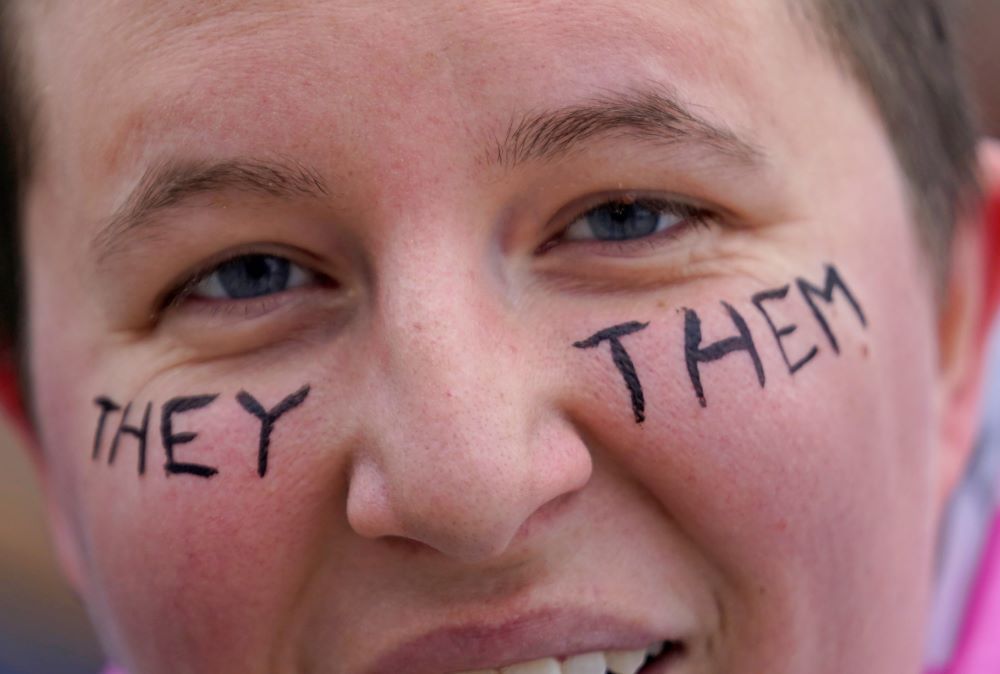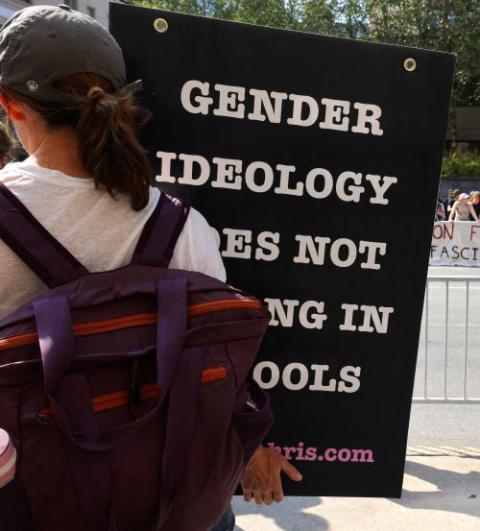
Zee Kilpack is photographed at a rally where hundreds gathered in support of transgender youth at the Utah State Capitol Jan. 24 in Salt Lake City. Utah lawmakers on Jan. 27 gave final approval for a measure that would ban most transgender youth from receiving gender-affirming health care like surgery or puberty blockers.. (AP/Rick Bowmer)
In a March 10 interview with Elisabetta Piqué of the Argentine newspaper La Nacion, Pope Francis touched on the topic of gender and gender theory. Francis clarified that he distinguishes between pastoral ministry to "persons who have different sexual orientations," on one hand, and "the ideology of gender," which he called "one of the most dangerous ideological colonizations." In Francis' view, "gender ideology" erases the differences between men and women, "making the world the same, all dull, all equal."
Pope Francis' pastoral care for all people, including those who are trans and gender-nonconforming, is commendable, especially in comparison to the way past popes and other church leaders have spoken of LGBTQ people. While Pope St. John Paul II elevated and idealized heterosexual married love in Theology of the Body, he often had harsh things to say about gay marriage and LGBTQ activism. And, as New Ways Ministry has pointed out, Pope Benedict's dehumanizing language, including his introduction of the term "intrinsic disorder" into the church’s moral lexicon, "caused grave harm" to LGBTQ people.
By contrast, Pope Francis, in keeping with his pastoral and synodal style, has frequently demonstrated a willingness to judge less and listen more. After centuries of dehumanizing rhetoric from Catholic authorities, Francis' famous "Who am I to judge?" in 2013 marked an important shift in perspective, even if most institutional leaders seem, at best, reluctant to follow his example and, at worst, determined to resist and oppose it.
But while Francis' pastoral approach to trans and gender-nonconforming individuals is commendable, his comments are still potentially harmful to those same people. Violence against LGBTQ people is on the rise. Right-wing politicians are pushing legislation targeting LGBTQ rights. In this cultural context, rhetoric linking trans, nonbinary or gender-nonconforming people to ideologies labeled "dangerous" heightens the risk for these individuals. Anyone expressing opinions about communities already vulnerable to harassment, exclusion, bullying and physical violence needs to think carefully about the effect of their words. This is especially the case for the head of one of the world's most powerful religions.
A common argument is that "it isn’t hate to speak the truth," or that people of faith are obliged to "speak the truth in love," meaning that Christians need to defend heteronormativity and the gender binary.
But there is a more fundamental problem with the idea that we are obliged to defend the gender binary. And that is that it is not an accurate account of reality.
I was trained to believe that it was. In my college philosophy classes, I was taught that there can only be two sexes, that gender identity was based exclusively in biological sex, and that the male/female distinction was not only about physical characteristics but also about immutable essences of "masculine" and "feminine," rooted in the unchanging mind of God, and informing all of nature.

A person protesting medical treatments for youth who identify as transgender stands across the street from counterprotesters outside Children's Hospital in Boston Sept. 18, 2022. Surgery and medical intervention to change a person's "sex characteristics" to those of opposite sex "are not morally justified," the U.S. bishops' doctrine committee said in a 14-page statement issued March 20, 2023. (OSV News/Reuters/Brian Snyder)
Until I was teaching philosophy myself, and preparing a section on the person, sex and gender, I had not closely interrogated these assumptions. But I always made a point, when working on new course material, of checking the peer-reviewed research, aware that scholarship might have developed, my memory might be faulty, or I might even have been incorrectly taught. It was then that I realized I had never been directed toward philosophical discussions of sex or gender utilizing data from the natural sciences.
So I began reading about how maleness, femaleness, sex and reproduction occur across different species and kingdoms in the natural world, and what I found was that the "truth" I had felt obligated to defend was a simplistic fantasy. The categories of male and female, as they exist in nature, are not an either/or, nor an absolute binary. Rather, they reside on a spectrum. Maleness and femaleness manifest in different ways depending on the species. It is difficult to pin down any set of conditions or characteristics we could point to as the sine qua non for identifying an organism as one or the other. Additionally, some species can change sexes. Others are hermaphrodites.
The real debate is not over whether gender ideology is bad, but over which ideology about gender aligns better with reality.
In the human species, male and female categories also exist on a spectrum. There is no singular cluster of necessary or sufficient conditions for male versus female identity. So sex organs can't be used as absolute determinants for gender identity. Chromosomes also won't work as determinants, because individuals can be chromosomally male or female while presenting characteristics typically associated with the opposite sex. Intersex people exist, and some researchers argue that intersex conditions are more common than once believed.
The gender binary I had long considered a way of categorizing all living beings was, I realized, more like a general taxonomical marker signaling a fluctuating set of characteristics on one side of a scale. As a kind of organizational shorthand, it is useful. But this does not mean that "male" and "female" are fixed and immutable metaphysical categories, or even fixed and immutable natural categories. What people refer to today as "gender ideology" is closer to accurately reflecting reality than the traditional binary view I grew up with.

People gather in support of transgender youth during a rally at the Utah State Capitol Jan. 24, 2023, in Salt Lake City. (AP/Rick Bowmer)
The debate over gender is framed by traditionalist Christians as a struggle between "reality" and "ideology." But the church already has a preferred ideology of gender, which is complementarian, essentialist and committed to a rigid binary view of the entire natural world. The real debate is not over whether gender ideology is bad but over which ideology about gender aligns better with reality.
There's still a lot we don't understand about sex and gender, in the natural world and in humans. But a view of gender as existing on a spectrum and allowing for flux and change more closely corresponds to what we do know. It also is more congruent with Jesus' Gospel teachings about radical equality and inclusion, and with an understanding of the person as dynamic, capable of growth and transformation, mirroring divine creativity. What Pope Francis refers to as "gender ideology" acknowledges and honors the complexity and uniqueness of each individual, the many different ways every created being mirrors the image of God.
Jesus taught a Gospel of radical equality and inclusion, and founded a church in which traditional hierarchies and power structures were overturned. He taught that the last should be first, that those who wish to lead need to learn to serve, and that all of us, regardless of gender, ethnicity or social caste, can equally present the image of God to the world.
Advertisement
In the centuries since, powerful forces have repeatedly attempted to co-opt Jesus' Gospel teachings and subvert them in service to the powerful and privileged. And, repeatedly, reform movements have emerged, to call the church back to its mission and ministry.
The church has changed before. Magisterial teachings develop. Maybe it's time for church teaching to develop once again, to better reflect truth and offer pastoral care to those who do not fit neatly into the artificial gender categories on which our church leaders seem fixated. Our LGBTQ siblings are vulnerable to new threats of anti-Christian and anti-life violence. Catholics who claim to be defenders of the truth and living witnesses to the Gospel should not be compounding these threats. And church leaders, including Pope Francis, might do well to ask themselves whether their stance toward trans people is truly in line with the teachings of Jesus.








